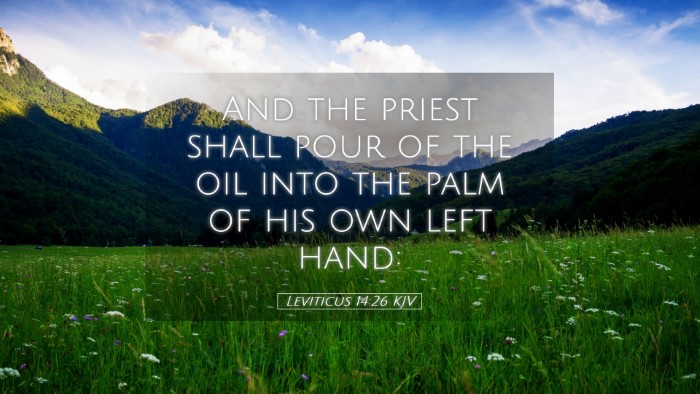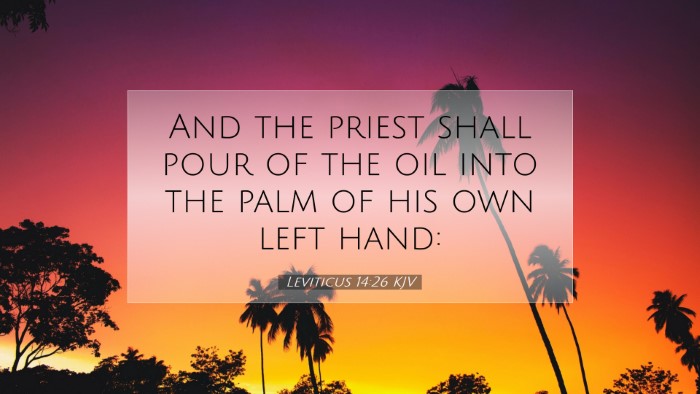Commentary on Leviticus 14:26
Verse: "And the priest shall pour of the oil into the palm of his own left hand."
Contextual Background
This verse is situated within the broader context of Leviticus 14, which outlines the ceremonial process for the cleansing of a leper. The chapter provides detailed instructions on sacrifices, purification rites, and the ritual importance of oil, all of which signify spiritual healing and restoration.
Exegesis and Commentary
This verse may seem straightforward, but it carries significant theological and practical implications:
1. The Role of the Priest
In Levitical law, the priest acted as a mediator between God and the people. Albert Barnes emphasizes that the priest's actions are not merely ritualistic; they are deeply symbolic of the healing work of God. The requirement for a priest to pour oil signifies the authority and responsibility placed upon him to restore the unclean to a state of wholeness.
2. Symbolism of Oil
Oil in biblical literature often represents the Holy Spirit, healing, and divine favor. Adam Clarke notes that the act of pouring oil into the priest's palm signifies the initial step in the ceremonial cleansing process. The early Church would later interpret these acts as foreshadowings of sacramental grace and the anointing of believers by the Spirit.
3. The Left Hand as a Symbolic Gesture
The pouring of oil into the priest's left hand is noteworthy. Matthew Henry suggests that the left hand can symbolize receptivity or a position of humility. This action may express an acknowledgment that the priest, while possessing divine authority, is ultimately relying on God's grace and mercy to carry out his functions. Each act in this ceremonial cleansing is infused with humility and dependence upon God.
4. Implications for Worship and Community
Understanding the significance of this ritual is essential for contemporary worship. The instructions given in Leviticus reflect a God who desires purity and wholeness among His people. Barnes observes that this passage, while linked to ancient Israelite practices, speaks timelessly to the need for spiritual renewal and communal restoration among believers today.
Theological Reflections
This verse should lead us to consider the broad implications of priestly intercession and community healing:
- Intercession: Just as the priest poured oil, Christians are called to intercede for one another, seeking God’s healing and blessing in the lives of the community.
- Spiritual Cleansing: The rituals described here remind believers of the transformative power of God’s grace, which cleanses hearts and restores relationships.
- Community Responsibility: The priest’s mediating role illustrates the communal dimension of faith; it is not only personal but also collective, as the health of one affects the whole body of Christ.
The Importance of Rituals
Rituals serve significant purposes in the life of the faith community. They embody the promises of God and create a tangible experience of grace. Clarke adds that through such rituals, the faithful are continually reminded of the covenant relationship established by God, emphasizing that these rituals were practical means of receiving God's grace.
Application for Today
This verse invites pastors and leaders to consider how the principles underlying this ancient practice can translate into modern ministry:
- Encouraging purity: Pastors must encourage spiritual purity within their congregations, reflecting the themes of cleansing and sanctification found throughout Scripture.
- Healing ministries: Churches are called to engage in healing ministries, understanding how spiritual and physical restoration work together in God's redemptive plan.
- Community Life: The communal aspect of worship and healing needs emphasis—encouraging congregants to pray for one another and create spaces for restoration.
Conclusion
Leviticus 14:26, while anchored in the ancient context of Israel's ceremonial law, holds rich significance for contemporary readers. The priest's act of pouring oil into his left hand symbolizes divine healing, the faithful intercession required in community life, and the broader spiritual truths that resonate through time. As pastors, scholars, and students reflect on this verse, they are reminded of the God who desires purity and wholeness for His people—a timeless message that calls for both individual and communal renewal.


